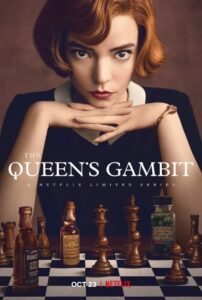Гаврюшина Дарья Павловна
Жукова Екатерина Вячеславовна
Фоминых Наталия Юрьевна
Российский экономический университет имени Г.В.Плеханова
Daria Pavlovna Gavryushina
Faculty of Marketing
Plekhanov Russian University of Economics
Ekaterina Viacheslavovna Zhukova
Faculty of Marketing
Plekhanov Russian University of Economics
Dr. Nataliia Fominykh
Professor of Foreign Languages №1 Department
Plekhanov Russian University of Economics
В рамках исследования рассмотрено влияние телевизионных трансляций на мышление человека, его поведение и принципы. Упор сделан на обзор воздействия сериалов на жизни людей на примере сериала «Ход королевы», рассмотрены первопричины изменений, затронута типология мышления и представлена наглядная статистика.
The study examines the impact of television broadcasts on human thinking, behavior and principles. Emphasis is placed on an overview of the impact of TV series on people’s lives on the example of the series «Queen’s Gambit», the root causes of change are considered, the typology of thinking is touched upon and visual statistics are presented.
- Кубякин Е.О. Особенности воздействия массовой культуры на социализацию российской молодежи / Общество: философия, история, культура. 2011. №2. С. 24-27.
- Петракова Екатерина Евгеньевна: Автореферат диссертации на соискание ученой степени кандидата психологических наук, 2007, 6с
- Портал vc.ru — Виктория Степанова, 2021,
- Реклама в коммуникационном процессе : учеб. пособие. СПб. : Питер, 2014. 304 с.
- Чернобровкина С.В. Образ героя современных подростков / Вестник Омского университета. Серия «Психология». 2013. № 2. С. 23-32.
- Information portal vc.ru – Victoria Stepanova, 2021
- Kubyakin E.O. Features of influence of mass culture on socialization of russian youth / Society: philosophy, history, culture. 2011, #2, 24-27p
- Petrakova Ekaterina Evgenievna, Abstract of dissertation for the degree of candidate of psychological sciences, 2007. 6p
- Reklama v kommunikatsionnom protsesse : ucheb. posobiye (2014) [Advertising in the communication process: textbook]. St. Petersburg: Piter. 304 p
- Chernobrovkina S. V. The image of the hero of modern teenagers/ Omsk University Bulletin. Series «Psychology». 2013. No. 2. P. 23–32
телевизионная реклама, связи с общественностью, пользовательское восприятие, стереотипы, психология
TV advertising, public relations, user perception, stereotypes, psychology
Гаврюшина Д.П., Жукова Е.В., Фоминых Н.Ю. «Телевизионный стиль»: роль сериалов в формировании образа жизни и поведения зрителя//Век информации (Сетевое издание), 2021, Т.5 №2(15) May 2021 https://doi.org/10.33941/age-info.com52(15)4
Gavryushina D.P., Zhukova E.V. Fominykh N.Y. «Television style»: the role of serials in shaping the lifestyle and behavior of the viewer//The Age of Information (Network edition), 2021, Vol.5 No. 2 (14) May 2021 https://doi.org/10.33941/age-info.com52(15)4
It is well known what a strong influence the media has on a person. Media materials — one of the main sources of socialization in most areas (individual, family, school and other public institutions). Advertising, undoubtedly, takes part in the formation of consumer demand and thus has a certain impact on human life. Advertising affects the formation of values and the way of life of a person, creates in the minds of people certain attitudes, stereotypes. The formation of a product on the market occurs simultaneously with the «reification» of abstract values prevailing in a given society, such as, for example, a sense of patriotism, family ties, the priority of domination over an individual, a man over a woman, etc. In other words, advertising is not only a certain system of representing objects, programming the consumer to purchase a product, forming models of behavior and relationships, but also a kind of ideological object that builds a system of symbolic values and attitudes: social, moral, gender, family, ethical, aesthetic, political, cultural, etc. [1]
Popular culture forms such ideals that are almost impossible to meet in real life, through TV series, feature films, novels, advertisements, etc. The images of the heroes combine character traits and appearance that are practically incompatible in reality to meet: intelligence, intellectual development and «pumped up muscles», external attractiveness, light-hearted humor and an aggressive, athletic character, etc. — for men; beauty, «glamor» and charm of the model, coupled with developed abilities for doing business, as well as for housekeeping, fidelity to the only man, etc. — for women. [2]
All these qualities in the images of heroes push us to choose the ideal for imitation in life. The image of the serial/film hero often have a significant impact on the mass consciousness, since with its help moral guidelines, value priorities, and ideals are set. There is also an opinion, that the television communication forms a new type of “significant other”. [3]. We can consider it like the viewer finds someone he would like to be alike in the serial or film and tries to imitate him unconsciously.
Knowledge of the characteristics of the image of the «hero» will allow predicting the direction of the moral development of adolescents, contributing to the formation of socially desirable qualities.
The image of a hero for modern adolescents is formed exclusively in the on-screen plane of interaction with the world.
With the help of serials, showing positive and interesting characters, you can influence the spheres of employment of adolescents, involve them in various types of activities, and have a positive impact on the development of personality, the system of relationships. [4]
We propose to investigate the recent situation regarding the television series «Queen’s Gambit».

Figure 1 Cover of the TV series «The Queen’s Gambit» |
This serial is a vivid example of people’s interest in the story and the way of thinking of the heroes. Each person from the audience noticed different things, but the one common item between their interests we have – chess. In the serial the main hero is a smart beautiful woman with her own goals and values. Obviously she has got a lot of fans both in the plot and in our life.
Viewers want to be alike or to be in the one line with such kind of people, so the chess purchases as the symbol of smartness and status were increase «right in front of us».
Here you can see the statistics regarding chess – education and chess – purchasing requests before and after release of the series: [5]

Figure 2 Сhess education and chess purchasing
From all of the above, we can conclude that it is possible to influence the consciousness of people, and in particular, on the youth, our future generation with the help of TV series or films. By creating new role models, a new society of people is being created, so TV shows play an important role in shaping the lifestyle and behavior of the viewer.
On the example of the TV series «Queen’s Move» we can observe the influence of this series, and in particular of the main character, gave impetus to the development of the intellectual abilities of young people and the maintenance of the long traditions of society.
REFERENCES
Список литературы
- Реклама в коммуникационном процессе : учеб. пособие. СПб. : Питер, 2014. 304 с. Reklama v kommunikatsionnom protsesse : ucheb. posobiye (2014) [Advertising in the communication process: textbook]. St. Petersburg: Piter. 304 p
- Кубякин Е.О. Особенности воздействия массовой культуры на социализацию российской молодежи / Общество: философия, история, культура. 2011. №2. С. 24-27.Kubyakin E.O. Features of influence of mass culture on socialization of russian youth / Society: philosophy, history, culture. 2011, #2, 24-27p
- Чернобровкина С.В. Образ героя современных подростков / Вестник Омского университета. Серия «Психология». 2013. № 2. С. 23-32. V. Chernobrovkina The image of the hero of modern teenagers/ Omsk University Bulletin. Series «Psychology». 2013. No. 2. P. 23–32
- Петракова Екатерина Евгеньевна: Автореферат диссертации на соискание ученой степени кандидата психологических наук, 2007, 6с
Petrakova Ekaterina Evgenievna, Abstract of dissertation for the degree of candidate of psychological sciences, 2007. 6p - Портал ru — Виктория Степанова, 2021,
Information portal vc.ru – Victoria Stepanova, 2021

